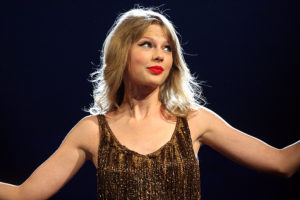After learning about the July 15 murder of Weymouth Sgt. Michael Chesna, Taylor Swift of Local 257 (Nashville, TN), donated tickets for her July show in nearby Foxborough, Massachusetts, to the Weymouth city police department. The free tickets were available to mourning Weymouth police officers, firefighters, and their extended families. Chesna was shot and killed while investigating an accident. Bystander Vera Adams was also killed.
Tag Archives: taylor swift
Judge Dismisses Copyright Suit Against Taylor Swift
A federal judge dismissed a lawsuit that accused Local 257 (Nashville, TN) member Taylor Swift of copyright infringement relating to her hit song “Shake It Off.” Songwriters Sean Hall and Nathan Butler brought the suit arguing that the chorus of the song was borrowed from their song “Playas Gon’ Play.”
Hall and Butler’s song includes the line: “Playas, they gonna play, and haters, they gonna hate,” and Swift’s song has the line: “Players gonna play, play, play, play, play, and haters gonna hate, hate, hate, hate, hate.”
Judge Michael W. Fitzgerald ruled that the phrases “playas gonna play” and “haters gonna hate” do not entail sufficient originality to warrant copyright protection. “The concept of actors acting in accordance with their essential nature is not at all creative; it is banal,” he says.

Swift Justice for Taylor
 Yesterday US District Court Judge Gail Standish dismissed a lawsuit brought against Local 257 (Nashville, TN) member Taylor Swift by Jessie Braham. Braham claimed that in writing the song “Shake It Off” Taylor took lyrics from his 2013 song “Haters Gone Hate.”
Yesterday US District Court Judge Gail Standish dismissed a lawsuit brought against Local 257 (Nashville, TN) member Taylor Swift by Jessie Braham. Braham claimed that in writing the song “Shake It Off” Taylor took lyrics from his 2013 song “Haters Gone Hate.”
The plaintiff had requested a waiver of the court filing fee as he had no means to pay it. That ended up a benefit to the defense, as it provided an early opportunity for the court to assess the allegations.
“When such a request is made, the court screens the suit to see if the allegations appear to have merit,” explains J. Michael Keyes is an intellectual property partner at the international law firm Dorsey & Whitney. “The Magistrate Judge considered the allegations and listened to Mr. Braham’s song “Haters Gone Hate” and Ms. Swift’s smash hit “Shake it Off.” The Court noted that after listening to the two songs, there is no support for Mr. Braham’s allegations.”
In making her ruling Standish used several puns, noting “the court is not saying that Braham can never, ever, ever get his case back in court,” and that, as currently drafted, “the complaint has a blank space—one that requires Braham to do more than write his name.” She concluded, “At least for the moment, defendants have shaken off this lawsuit.”
“The court’s recommendation is a welcome outcome. Copyright law is meant to protect one’s original musical composition from misappropriation by another. One need only casually listen to the two works to see that Ms. Swift’s smash hit bears no resemblance to Mr. Braham’s work,” says Keyes.
Apple Makes Swift Change in Plan
 Last week, indie labels and artists put pressure on Apple to compensate artists during the three-month trial period for its new streaming service. Musicians feared, in particular, that they would miss out on opportunities to get financial return from new music launched during Apple Music’s free introductory period, beginning June 30.
Last week, indie labels and artists put pressure on Apple to compensate artists during the three-month trial period for its new streaming service. Musicians feared, in particular, that they would miss out on opportunities to get financial return from new music launched during Apple Music’s free introductory period, beginning June 30.
This weekend, Local 257 (Nashville, TN) member Taylor Swift posted an open letter on her Tumblr page saying she would withhold her latest album, 1989, from the service because of this situation. The letter read, in part: “I find it to be shocking, disappointing, and completely unlike this historically progressive and generous company … This is not about me. Thankfully, I am on my fifth album and can support myself, my band, crew, and entire management team, by playing live shows. This is about the new artist or band that has just released their first single and will not be paid for its success. This is about the young songwriter who just got his or her first cut and thought that the royalties from that would get them out of debt … We know how astronomically successful Apple has been and we know that this incredible company has the money to pay artists, writers, and producers for the three-month trial period.”
According to Billboard, Apple Senior Vice President Eddy Cue reached out to Swift, letting her know he had heard her concerns, as well as the concerns of indie musicians across the country. Apple also announced that it will now be paying royalties to artists and record labels during the introductory first three months.

